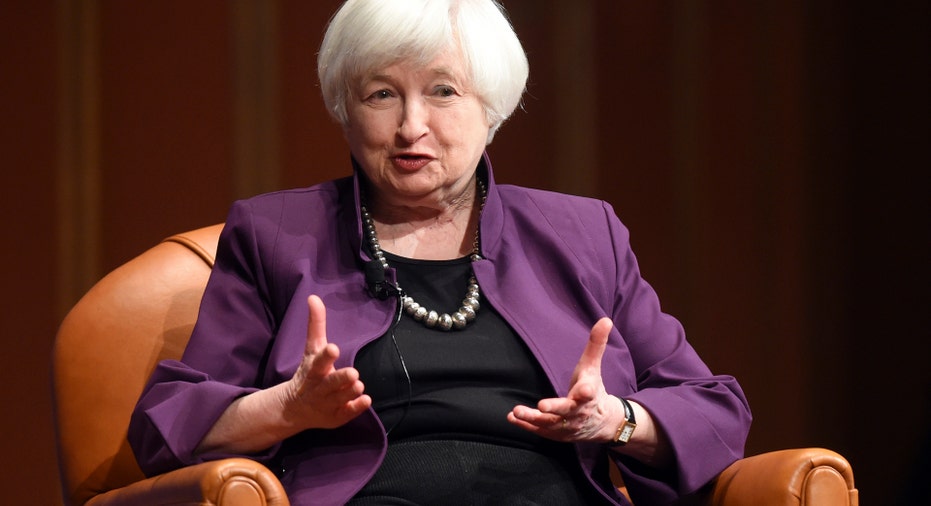Wall St. dips after Fed rate hike; tech slumps again

A slide in technology stocks pulled down the Nasdaq Composite on Wednesday and the S&P 500 ended slightly lower, as investors worried about the pace of economic growth after weaker-than-expected inflation numbers and an interest rate hike from the Federal Reserve.
The Nasdaq cut its loss in more than half in a late rebound, having earlier fallen 1 percent, while financials buoyed the Dow industrials.
The U.S. central bank cited continued U.S. economic growth and job market strength, proceeding with its first tightening cycle in more than a decade.
But some investors worried about the Fed's hawkish tone and that concerns about rate hikes were being reflected in the tech sector, which has led the S&P 500's nearly 9-percent rally this year.
The tech sector fell 0.5 percent, recovering from steeper losses in the session and coming on the heels of its biggest two-day swoon in nearly a year. Tech remains up 18 percent in 2017.
"I think it’s more of what we saw starting last week, where you have a very crowded trade ... If they are going to get more nervous about the stock market, that’s where you are going to see the selling," said William Delwiche, Investment Strategist at Robert W. Baird & Co in Milwaukee.
The Dow Jones Industrial Average rose 46.09 points, or 0.22 percent, to 21,374.56, the S&P 500 lost 2.43 points, or 0.10 percent, to 2,437.92 and the Nasdaq Composite dropped 25.48 points, or 0.41 percent, to 6,194.89.
Earlier on Wednesday, data showed U.S. consumer prices unexpectedly fell in May and retail sales recorded their biggest drop in 16 months.
"The kiss of death for tech stocks is negative GDP or a slowdown in the software and equipment component," said Daniel Morgan, portfolio manager at Synovus Trust in Atlanta. "Hence, the tech sector is selling off on concerns that today’s Fed hike will slow GDP, retarding future tech profit growth."
Financials, which have underperformed this year and tend to benefit in a rising rate environment, rallied late to close up 0.2 percent. The group had fallen as much as 1.3 percent during the session.
The energy sector dropped 1.8 percent as oil prices weakened. U.S. data showed an unexpectedly large weekly build in U.S. gasoline inventories and International Energy Agency (IEA) data projected a big increase in non-OPEC output in 2018.
The Dow Jones Transport Average index, seen by some as a barometer of economic activity, ended down 0.7 percent.
The Fed clearly outlined a plan to reduce its $4.2-trillion portfolio of Treasury bonds and mortgage-backed securities, most of which were purchased in the wake of the 2007-2009 financial crisis and recession.
"The market should take confidence in the fact that they’re being very transparent in setting clear policy steps in terms of how they normalize the balance sheet," said Heidi Learner, chief economist for Savills Studley, a unit of Savills Plc, in New York. "Certainly more transparency is a good thing."
In corporate news, Alexion shares jumped 9.3 percent and were the biggest percentage gainers on the S&P 500 after the biotechnology company named Biogen's chief financial officer as its CFO. Biogen's stock fell 3.1 percent.
H & R Block rose 7.9 percent after the tax preparation service's quarterly revenue and profit beat analysts' expectations.
Declining issues outnumbered advancing ones on the NYSE by a 1.13-to-1 ratio; on Nasdaq, a 1.41-to-1 ratio favored decliners.
About 7.1 billion shares changed hands in U.S. exchanges, above the 6.8 billion daily average over the last 20 sessions.
(Additional reporting by Rodrigo Campos and Herb Lash in New York and Yashaswini Swamynathan in Bengaluru; Editing by Nick Zieminski and Jeffrey Benkoe)



















